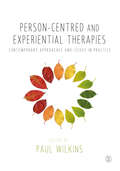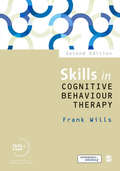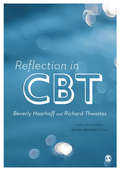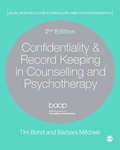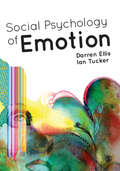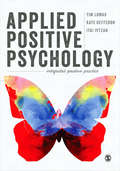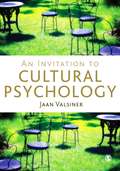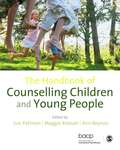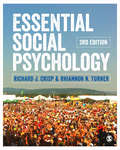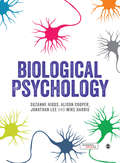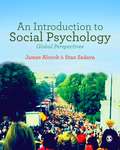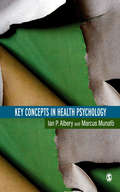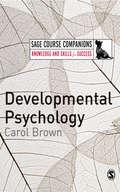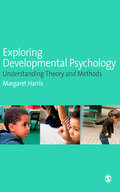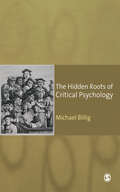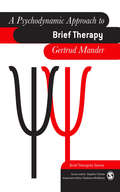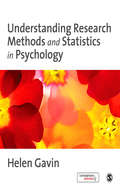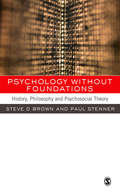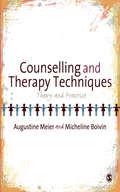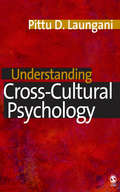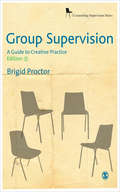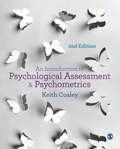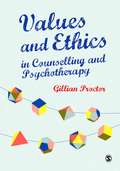- Table View
- List View
Person-centred and Experiential Therapies: Contemporary Approaches and Issues in Practice
by Paul WilkinsAn essential new guide for any person-centred trainee or practitioner, this book explores some of the key contemporary counselling and psychotherapy approaches that have developed from classical client-centred therapy. Part One discusses five approaches including Classic Client-Centred Therapy; Relational and Dialogical Person-Centred Therapy; Focusing-Oriented Therapy; Experiential Therapy; Emotion Focussed Therapy and Person-Centred Expressive therapy. Each approach is introduced, considered in terms of its history, development, current context and relevant research, as well as exemplified through a range of inspiring vignettes. Part Two brings readers up-to-date with recent developments in the application of person-centred practice, including creative approaches, transcultural counselling, work with people who’ve experienced trauma as well as those who are experiencing limitations to their ability. Written by leading UK-based and international authors, this authoritative and thought-provoking book is a must read for anyone keen to understand the many approaches of person-centred therapy.
Skills in Cognitive Behaviour Therapy (Skills in Counselling & Psychotherapy Series)
by Frank WillsThis step-by-step guide to the core skills and techniques of the cognitive behaviour approach is suitable for those with little or no prior experience in CBT. The author uses case examples from a variety of settings to illustrate the skills needed at each stage of the therapeutic process, and brings the therapeutic relationship to the foreground to show you how to build and maintain a successful working alliance with your clients. This second edition includes new content on: - the historical foundations of CBT - common presenting issues, such as depression and anxiety - third wave CBT - IAPT - insights from other approaches, relevant to trainees in other modalities with an interest in CBT Accompanied by a new companion website (https://study.sagepub.com/wills), which includes additional case studies, template forms, PowerPoint presentations for each chapter, and a wealth of material for further reading, this is an essential text for anyone wishing to hone their therapeutic skills in CBT.
Reflection in CBT
by Beverly Haarhoff Richard ThwaitesDeveloping skills and competency in CBT is a complex process of which self-observation and self-reflection are an essential part. In this new book, leading figures Beverly Haarhoff and Richard Thwaites outline the rationale for a focus on self-reflective practice in CBT, before offering practical and accessible guidelines demonstrating how this can be achieved in training and practice. Highlighting relevant research throughout and using case studies to illustrate theory in practice, ten chapters consider: - reflection in training and in supervision and self-supervision, - reflecting on the therapeutic relationship, on our sociocultural perceptions and biases and on client feedback - how reflection is vital to self-care and to becoming a better therapist, supervisor and trainer. This is an essential read for trainees in both high and low intensity CBT programmes, those on broader CBT courses, and for qualified practitioners working independently to enhance their self-reflective capacity.
Confidentiality & Record Keeping in Counselling & Psychotherapy (Legal Resources Counsellors & Psychotherapists)
by Tim Bond Barbara MitchelsThis indispensible text is your students' first point of reference when faced with a situation or dilemma of a legal nature regarding record keeping or confidentiality issues. Reflecting changes in policy and law and developments in practice since its last publication in 2008, this new edition has been expanded into 14 new and thoroughly revised chapters. New content includes: - The latest Data Protection Act guidance including data protection implications when working with technology and for online therapy - Greater content on sharing information, including sharing information in supervision, training, research, audit and, crucially, across professions - Expanded content on mental capacity with separate chapters for children and vulnerable adults - A new chapter on pre-trial therapy with adults and children, including Special Measures, Crown Prosecution Service guidance and victim support - A new chapter on practice dilemmas, providing advice and encouraging further discussion and reflection - The role of supervision and of the supervisor Using reflective questions, sample dilemmas and case scenarios throughout, the authors illustrate how to practically address the difficult confidentiality and record keeping issues that therapists regularly face. Current legal guidelines and frameworks are interspersed throughout the book which, along with revised disclosure checklists and links to useful organisations and contacts, ensure trainee and practising therapists are well versed in current best-practice.
Social Psychology of Emotion
by Darren Ellis Ian TuckerThe study of emotion tends to breach traditional academic boundaries and binary lingustics. It requires multi-modal perspectives and the suspension of dualistic conventions to appreciate its complexity. This book analyses historical, philosophical, psychological, biological, sociological, post-structural, and technological perspectives of emotion that it argues are important for a viable social psychology of emotion. It begins with early ancient philosophical conceptualisations of pathos and ends with analytical discussions of the transmission of affect which permeate the digital revolution. It is essential reading for upper level students and researchers of emotion in psychology, sociology, psychosocial studies and across the social sciences.
Applied Positive Psychology: Integrated Positive Practice
by Dr Tim Lomas Kate Hefferon Itai IvtzanInstructors - Electronic inspection copies are available or contact your local sales representative for an inspection copy of the print version. “If you think you know what positive psychology is, think again! This book offers a new integrative vision for making life better that takes in the body and the brain, culture and society, childhood and development... A must read for students.” - Stephen Joseph, University of Nottingham "Captures the best of the positive psychology initiative, and most importantly, translates it to practice. The authors bring remarkable depth and breadth to the subject matter and do so in a way that is fresh, engaging, relevant, and unusually thoughtful." - Carol Ryff, University of Wisconsin-Madison "If you want to understand what positive psychology really is, learn how it works in practice and discover its huge potential to transform our lives and our world then look no further than this superb book. I really can't recommend it highly enough." - Mark Williamson, Director of Action for Happiness This exciting new textbook, written by leading academics in the UK, offers the very first authored title on applied positive psychology for university courses. Consisting of the latest cutting-edge theory and research in the subject and structured around a pioneering multidimensional model of wellbeing, this book will provide you with the knowledge and tools to apply positive psychology in many areas of life. These include interventions aimed at developing mental and physical functioning, to recommendations for enhancing relationships and reshaping organisational structures. The book shows how these practices can be successfully deployed in diverse real-world settings, from the classroom to the workplace. Key features include: Learning objectives set out at the start of each chapter Practice essay questions throughout and quizzes to test your knowledge at the end of each chapter Useful measurement tools and recommendations for research Summary boxes and suggested further reading and resources Case studies and ‘Reflection’ boxes that invite you to explore topics in greater depth and relate findings to your everyday life. This book will be essential reading for all students with an interest in or studying a course in applied positive psychology, and is strongly recommended to students taking a wider course in positive psychology and the psychology of happiness and wellbeing.
An Invitation to Cultural Psychology
by Professor Jaan ValsinerInstructors - Electronic inspection copies are available or contact your local sales representative for an inspection copy of the print version. An Invitation to Cultural Psychology looks at the everyday life worlds of human beings through the lens of a new synthetic perspective in cultural psychology – that of semiotic dynamics. Based on historical work from many different fields in the social and behavioural sciences, and the humanities too, this perspective applied to cultural psychology suggests that human beings are constantly creating, maintaining and abandoning hierarchies of meanings within all cultural contexts they experience. It’s a perspective that leans heavily on the work of the great French philosopher, Henri Bergson, only now being realised as a core basis for human cultural living. Jaan Valsiner is the founding editor of the major journal in the field, Culture & Psychology, and Editor of the Oxford Handbook of Culture and Psychology. He is the first Niels Bohr Professor of Cultural Psychology at Aalborg University in Denmark, where he leads Europe's first Research Centre on Cultural Psychology.
The Handbook of Counselling Children & Young People
by Sue Pattison Maggie Robson Ann BeynonThis landmark handbook brings together the fundamentals of counselling children and young people theory, research, skills and practice. It addresses what every successful trainee or practitioner needs to know in a way that is comprehensive, accessible and jargon-free. Divided into four parts, it covers: theory and practice approaches, including chapters on child development, person-centred, psychodynamic, CBT, Gestalt approaches, and more counselling process, including chapters on the therapeutic relationship, skills, groupwork, supervision practice issues, including chapters on law and policy, ethics, diversity, challenging behaviour practice settings, including chapters on health and social care settings, school and education, multi-agency and collaboration. Each chapter includes a chapter introduction and summary, reflective questions and activities, helping trainees to cement their learning. With chapters contributed by leading experts and academics in the field, this book is essential reading for trainees and practitioners working with children and young people.
Essential Social Psychology
by Richard J. Crisp Professor Rhiannon TurnerFrom aggression to altruism, prejudice to persuasion, Essential Social Psychology 3e introduces students to the discoveries and debates that define social psychology today. It covers both classic and cutting edge research studies and provides plenty of real life examples and illustrations to help students to develop a good understanding of the subject whilst building the confidence to apply this knowledge successfully in assignments and exams. An extensive range of learning aids including a glossary, summary sections and memory maps – combined with an array of features on the student section of the companion website – will help reinforce this learning and check retention at specific milestones throughout the course. New to the third edition: A new full-colour design Two brand new chapters on Applied Social Psychology and Social Psychological Methods Coverage of some developing research perspectives including social neuroscience and evolutionary psychology New ‘Back to the Real World’ textboxes which situate academic findings in the context of the world around you An enhanced SAGE edge™ companion website (study.sagepub.com/crispandturner3e) with a suite of features to enhance your learning experience.
Biological Psychology
by Dr Suzanne Higgs Dr Alison Cooper Dr Jonathan H. Lee Mike HarrisWritten to guide undergraduate students new to brain and behaviour through the key biological concepts that determine how we act, Biological Psychology provides a comprehensive introduction to the subject. It includes detailed coverage of sensation, movement, sleep, eating and emotions, with further chapters on the biological basis of psychological disorders and the effects of drug-taking. Uniquely, the authors emphasize the importance of learning and memory as a key thread throughout and include advanced chapters on key research areas that push discussion further and encourage critical thinking, making this book appropriate for undergraduates studying biological psychology at any level. Key features include: ‘Spotlights’ offering insights into key areas of research that expose the most important developing issues in the field today A clear structure including roadmaps and key points for each chapter to ease navigation through the book and understanding of the links between concepts Full colour presentation to bring the topics to life through clear and comprehensive illustrations and diagrams A companion website at study.sagepub.com/higgs with a range of materials for instructors and students
An Introduction to Social Psychology: Global Perspectives
by James Alcock Stan SadavaPsychology recognises no borders. The relationships between people and the groups they form are determined by similar principles no matter where in the world they come from. This book has been written to introduce students from all countries and backgrounds to the exciting field of social psychology. Recognising the limitations that come from studying the subject through the lens of any one culture, James Alcock and Stan Sadava have crafted a truly international social psychology book for the modern era. Based on classic and cutting-edge scholarship from across the world, An Introduction to Social Psychology encourages mastery of the basics as well as critical thinking. Incorporating relevant insights from social neuroscience, evolutionary theory and positive psychology, it offers: Chapters on crowd behaviour and applied social psychology Discussion of new means of social interaction, including social media Relevant insights from social neuroscience, evolutionary theory and positive psychology A companion website at study.sagepub.com/alcocksadava featuring extensive additional resources for students and instructors
Blank Minds and Sticky Moments in Counselling: Practical Strategies and Provocative Themes
by Graham Dexter Dr Janice Dexter'I recommend the book as an essential, core, alternative or complementary text for trainees in counselling, hitting as it does, just the right notes of honesty, realism, humour and theory-made-digestible. It deserves to be on the reading lists of all certificate and diploma courses - now' - Colin Feltham, Sheffield Hallam University Blank Minds and Sticky Moments in Counselling, Second Edition is a popular and down-to-earth guide to the common challenges which arise in everyday counselling practice. Drawing on humour and over 30 years experience, the authors describe a range of strategies to help practitioners and trainees through the 'sticky' moments and offer reassurance that 'you are not alone' in facing these dilemmas. The book explores what to do when you: " feel stuck and are failing to help the client move forward " are faced with a client who struggles with verbal communication " encounter a client with mental-health problems " find interpersonal issues are affecting your view of a client " find yourself at odds with the values of your client The authors also tackle broader issues concerning what it means to be professional, tensions between theory and practice and offer a four-stage model of counselling as a framework for practice. The underlying goal of the book is to help readers see difficult moments as learning experiences and to feel empowered to be imaginative, creative and flexible practitioners. Blank Minds and Sticky Moments in Counselling, Second Edition is a rich source of practical advice for trainees and practitioners. Graham Dexter and Janice Russell are freelance trainers and consultants in counselling.
Key Concepts in Health Psychology
by Dr Ian Albery Dr Marcus MunafoWhile current textbooks in health psychology offer the reader some conceptual reasoning about different aspects of the discipline, there is no one source which provides an accessible, navigable and cross-referenced analysis of the major models and ideas in health psychology. Key Concepts in Health Psychology provides a `one stop' analysis of key issues, theories, models and methods in contemporary health psychology. It enables the reader to engage with a full range of approaches and methods in the field, and importantly to be able to appreciate the relationships between these.
Developmental Psychology: A Course Companion (SAGE Course Companions series)
by Carol BrownDevelopmental Psychology provides student readers with essential help in all aspects of their first course in developmental psychology, including advice on revising exams, preparing and writing course assessment materials, and enhancing and progressing their knowledge and skills in line with course requirements on a developmental psychology course. This Course Companion is designed to augment, rather than replace, existing textbooks for the course, and will provide: - Helpful summaries of the course curriculum to aid lecture notes, seminars and written assignments - Key summaries of the approach taken by the main developmental psychology textbooks - Guidance on the essential study skills required - Help with developing critical thinking - Route-maps to aid the development of wider learning above and beyond textbooks - Pointers to success in course exams - A tutor's-eye view of what course examiners are looking for - An insider's view of what key course concepts are really all about
Exploring Developmental Psychology: Understanding Theory and Methods
by Margaret Harris`This is a beautifully written account of the most important ways in which developmental psychologists go about their business, illustrated with carefully chosen articles which are carefully described in order to make the designs, methodologies, analysis and interpretation of the results readily accessible to a non-expert readership. This will become the preferred textbook for those who want an up-to-date, interesting and accessible introduction to developmental psychology research' - Alan Slater, University of Exeter A wide range of techniques is used to investigate children's development. This book, which is aimed at advanced undergraduates and postgraduate students in psychology and related areas, provides a guide to key theories and methods used by researchers. Carefully chosen articles are accompanied by a commentary from the author that, among other things, helps students to understand the rationale for a study, the choice of design and assessment measures, use of statistics and the interpretation of results. A wide range of recent research papers is included to cover observational and experimental methods from infancy to adolescence. The research papers are introduced by two chapters that consider the relationship between theory and methods, explaining how models of development differ from one another and how they can be tested through experimental studies.
The Hidden Roots of Critical Psychology: Understanding the Impact of Locke, Shaftesbury and Reid
by Michael Billig`Billig's is a fascinating work of brilliant scholarship. It is written in an elegant style, spiced with humour, and gives one the feeling that it was a labour of love. It can be recommended without reservation' - Journal of Community and Applied Social Psychology `This is a quite extraordinary and original book. Billig has managed seamlessly to interweave History of Philosophy, History of Psychology, Critical Psychology and a deep grasp of the social nature of language and, moreover, do so in a very readable fashion' - Graham Richards, Formerly Professor of History of Psychology, Staffordshire University and Director of the British Psychological Society History of Psychology Centre, London `I can't quite capture how much I enjoyed this book. In beautiful, witty prose and through exemplary scholarship, Billig has produced an historical work that engages with profoundly important ideas not just for contemporary critical psychology but for psychology in general. Books as good as this are rare' - Alan Collins, Senior Lecturer in Psychology, Lancaster University Today new forms of critical psychology are challenging the cognitive revolution that has dominated psychology for the past three decades. This book explores the historical roots of these new psychologies. It demonstrates that their ideas are not quite as new as is often supposed. In the early modern period, thinkers like the Earl of Shaftesbury and Thomas Reid reacted against Locke's cognitive psychology in ways that were surprisingly modern, if not post-modern. However, until now, they have been virtually written out of psychology's history. It is now time to recognize the great originality of their psychological thinking. Writing in a non-technical style, Michael Billig seeks to overturn the dominant views of psychology's history. In so doing, he gives a fascinating account of the times, bringing psychology's hidden past vividly back to life.
A Psychodynamic Approach to Brief Therapy (Brief Therapies series)
by Dr Gertrud ManderIllustrated throughout with clinical vignettes, this book is a comprehensive guide to psychodynamic brief counselling and psychotherapy. It is ideal for those looking for a practical introduction to the subject. Following a summary of the roots and development of psychoanalytic theory, psychodynamic models of brief, short-term and time-limited work are described. The author describes their differences and similarities in terms of duration, technique and the contexts for which they were developed. Gertrud Mander then examines the basics of brief therapeutic practice from a psychodynamic perspective, starting with assessment, contracting, structuring and focusing. The active stance of the brief therapist is emphasized, and the importance of beginnings and endings, and of supervision and training, are particularly stressed.
Skills in Cognitive Behaviour Counselling & Psychotherapy
by Frank WillsSkills in Cognitive Behaviour Counselling and Psychotherapy is a practical guide to the core techniques used when working with clients in a range of therapeutic settings. Representing a truly contemporary view of the cognitive behavioural approach, Frank Wills describes the process of working in a collaborative and interpersonally informed way with clients. The book stresses the need for an emotionally based CBT and outlines the essential skills used by practitioners in: " making assessments " mapping issues (formulation) " developing a therapeutic relationship, and " promoting change in thinking, feelings and behaviour. The book also features exercises, samples of therapist-client dialogue and case studies to illustrate key points and deepen understanding. Skills in Cognitive Behaviour Counselling and Psychotherapy is written for those who are undertaking skills training and preparing to work in a wide range of health, mental health and general counselling settings. Frank Wills is an independent cognitive psychotherapist in Bristol, and a tutor at the University of Wales, Newport.
Understanding Research Methods and Statistics in Psychology
by Helen GavinUnderstanding and applying research methods and statistics in psychology is one of the corner stones of study at undergraduate level. To enable all undergraduate psychology students to carry out their own investigations the textbook covers basic and advanced qualitative and quantitative methods and follows a sequential structure starting from first principles to more advanced techniques. Accompanied by a companion website, the textbook: - Grounds all techniques to psychological theory relating each topic under discussion to well established pieces of research - Can be used by the student at beginning and more advanced undergraduate level - therefore a `one-stop' shop - Includes a creative and practical selection of heuristic devices that cement knowledge of the techniques and skills covered in the textbook
Psychology without Foundations: History, Philosophy and Psychosocial Theory
by Steven Brown Paul StennerFor many years, for many people social psychology has been deemed a discipline in crisis.<P><P> This new book proposes a way out of the crisis by letting go of the idea that psychology needs new foundations or a new identity, whether biological, discursive or cognitive. The psychological is not narrowly confined to any one aspect of human experience; it is quite literally everywhere. <P> The book proposes a strong process-oriented approach to the psychological, which studies events or occasions. Aspects of experience such as communication or embodiment are treated as thoroughly mediated - the product of multiple intersecting relationships between the biological, the psychic and the social. The outcome is an image of a mobile, reflexively founded discipline which follows the psychological wherever it takes us, from the depths of embodiment to the complexities of modern global politics.
Counselling and Therapy Techniques: Theory & Practice
by Micheline Boivin Augustine MeierThis is the first book on counselling skills to look in detail at the practical interventions and tools used to establish the therapeutic relationship. Step-by-step, the text teaches the reader exactly how to use these skills with clients to address their concerns and achieve therapeutic change. Integrative and pluralistic in approach, the text covers the key techniques from all the major therapeutic models, placing them in their historical and theoretical contexts. Techniques covered include empathic responding, experiential focusing, Gestalt, metaphors, task-directed imagery, ego state therapy, solution focused therapy, cognitive behvioral therapy, narrative therapy and self-in-relationship therapy. The book: - presents each technique from the perspective of its underlying theory; - gives practical instruction on how to deliver each intervention; - provides extracts from counselling sessions to demonstrate the technique in action. This book is crucial reading for all trainees on counselling and psychotherapy courses or preparing to use counselling techniques in a range of other professional settings. It is also helpful for professionals who wish to acquire additional skills. Augustine Meier, certified clinical psychologist, professor Emeritus, Faculty of Human Sciences, Saint Paul University, Ottawa, Ontario and Founder and President of the Ottawa Institute for Object Relations Therapy. Micheline Boivin, certified clinical psychologist, Psychological Services of the Family, Youth and Children's Program at the Centre for Health and Social Services, Gatineau, Québec.
Understanding Cross-Cultural Psychology: Eastern and Western Perspectives
by Dr Pittu D LaunganiEloquently introducing students to international perspectives on cross-cultural psychology (both Eastern and Western cultures), this textbook contains many features to promote student learning. It: - contains an array of vignettes, case studies and other text features - addresses international research on cross-cultural psychology unlike other books that focus purely on Western perspectives - is thoughtfully yet provocatively written, appropriately combining the narrative and the informative The main thrust of the book's content is to discuss the framework of culture, family structure, health, bereavement and intercultural interaction - and all of their intersections - and consideration is also given to methodological and ethical research issues and their application to differing cultures.
Group Supervision: A Guide to Creative Practice (Counselling Supervision series)
by Ms Brigid Proctor`The Second Edition of Group Supervision is essential reading for all participants in group supervision. It offers a comprehensive insight into the complexities of organising, managing and creatively facilitating a group or of being a practitioner in a cooperative peer group' - Professor Sue Wheeler University of Leicester Among the plethora of supervision books, Group Supervision is the only one dedicated to group work. Brigid Proctor shows how group supervision can provide a supportive environment in which practitioners learn from each others' experience, finding positive and creative ways of working with the diversity which characterises all groups. Examining tasks, roles and responsibilities of both supervisors and supervisees, she describes the skills needed for: " managing different types of group, " developing a flexible leadership style " making sense of group and individual needs " using creative methods. The Second Edition of this popular text features up-to-date research findings on group supervision in organisations and further coverage of the challenge of ethical decision-making in groups. A new chapter considers the advantages of groups for supervisor development and training, stressing the urgency for greater accountability and research. Essential for all supervisors and trainers, the practical information in this book will also benefit those who manage organizations providing group supervision for counsellors and psychotherapists- be they employees, volunteers or trainees. Brigid Proctor, Fellow of the BACP, is a retired Director of Counselling courses at South West London College and has subsequently worked freelance as a counsellor, supervisor, trainer and consultant.
An Introduction to Psychological Assessment and Psychometrics
by Keith CoaleyIn An Introduction to Psychological Assessment and Psychometrics, Keith Coaley outlines the key ingredients of psychological assessment, providing case studies to illustrate their application, making it an ideal textbook for courses on psychometrics or psychological assessment.<P><P> New to the Second Edition:<P> * Includes occupational and educational settings<P> * Covers ethical and professional issues with a strong practical focus<P> * Case study material related to work selection settings <P> * End of chapter self-assessments to facilitate students’ progress<P> * Complaint with the latest BPS Certificate of Testing curriculum
Values & Ethics in Counselling and Psychotherapy
by Gillian M ProctorThis book offers an introduction to values and ethics in counselling and psychotherapy, helping you to develop the ethical awareness needed throughout the counselling process. The book covers: - Context and emergence of ethics in counselling - Exercises to explore personal and professional values - Tools to develop ethical mindfulness - Differences between therapeutic models - Relational ethics - Ethical dilemmas and issues - Practice issues including confidentiality, boundaries and autonomy versus beneficence. Using in-depth case studies of counselling students, the author demonstrates the constant relevance of values and ethics to counselling and psychotherapy, equipping trainees with the tools to successfully navigate values and ethics in their professional practice.
